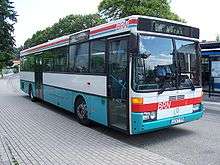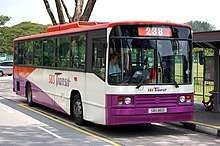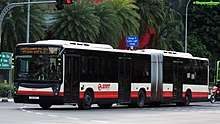Mercedes-Benz O405
The Mercedes-Benz O405 was a highly successful single-decker bus manufactured by Mercedes-Benz from the mid-1980s to the early 2000s as either an integral bus or a bus chassis and was the last VöV SL-II standard bus in production. It was the replacement for the Mercedes-Benz O305 and was widely used in Europe, the United Kingdom, Australia and Singapore with 12,000 produced.
| Mercedes-Benz O405 | |
|---|---|
 Mercedes O405 (integral) in Viernheim | |
| Overview | |
| Manufacturer | Mercedes-Benz |
| Production | 1983−2001 |
| Assembly | Mannheim, Germany |
| Body and chassis | |
| Class | Complete bus Bus chassis |
| Layout | Rear-engine |
| Doors | 1 or 2 doors (rigid) 2 or 3 doors (articulated) |
| Floor type | High floor Low floor Low entry |
| Powertrain | |
| Engine | OM447h (157 kW) OM447h (177 kW) OM447hII (184 kW) OM447hLA (184 kW) |
| Capacity | 60 to 104 passengers (35 seated to 61 seated) |
| Transmission | Mercedes-Benz W3E110/2.2R Mercedes-Benz W3E112/2.2R Mercedes-Benz W4E Allison B400R Voith DIWA 851.2 Voith DIWA 864.3 ZF 4HP500 ZF 5HP500 |
| Dimensions | |
| Length | 11.1 m 11.7 m 12.2 m (rigid)/17.1m, 18.0m (articulated) |
| Width | 2.5 m |
| Chronology | |
| Predecessor | Mercedes-Benz O305 (single decker and articulated) |
| Successor | Mercedes-Benz Citaro (O530) Mercedes-Benz OC500LE |
Standard floor version
The step-entrance version was known as the O405. A 3-axle articulated version was also built known as O405G and a trolleybus as the O405T.[1] There were two generations of O405, designated as O405 MkI and O405 MkII. Most of them have their boxy roof dome (slightly arched) with a double-curvature windscreen, separately mounted destination indicator and pantograph system windshield wipers that was used on some buses such as the Dennis Dart, Leyland Lynx, MAN NL262 and the MAN SL202.
O405 Mark I
The O405 Mark I was marketed between mid-1980s and early 1990s. It was unveiled in September 1983.[1] It featured a Mercedes Benz OM447h naturally aspirated engine with outputs of either 157kW (210hp) or 184 kW (250 hp). Optionally available was a naturally aspirated compressed natural gas (CNG) engine model M447hG with 150 kW (205 hp) output. The gearbox coupled to the engine was usually the Mercedes-Benz W3E110/2.2R or Mercedes-Benz W3E112/2.2R (the former being able to handle the more powerful 184 kW engine), although there have been other gearboxes such as the ZF 5HP 500 or Allison B300R coupled to the engine.
O405 Mark II
The O405 Mark II was marketed from the early 1990s to the late 1990s and into the early 2000s in some parts of the world. It featured a Mercedes-Benz OM447hA turbocharged engine with an output of 184 kW (250 hp), although some examples feature either a naturally aspirated engine (OM447h-II), a turbocharged engine (OM447hA) or a turbocharged, intercooled engine (OM447hLA). The gearbox coupled to the engine was either the ZF 4HP 500 or 5HP 500, or the Voith D864.3.
From 1994, this chassis was available with the M447hG Euro II 175 kW (238 hp) naturally aspirated compressed natural gas (CNG) engine.
Low-Floor Version: O405N
The low-floor version of the regular O405 was known as the O405N (or O405GN for the 3-axle articulated version) was released in September 1989, later a further developed version was also built, it was known as the O405N²/O405N2 (or O405GN²/O405GN2 for the 3-axle articulated version).[1] The O405(G)N do not have steps at the entrances and exits, but the seats are mounted on "platforms". The GN2 type addressed this problem. These buses are usually fitted with ZF transmissions, but some are fitted with Voith examples. It has a boxy roof dome (slightly arched) similar to the MAN NL202 and the MAN NL262 with a double-curvature windscreen with a separately mounted destination display just that it has a full low floor layout with seats mounted on platforms.
Low-Entry Version: O405NH
.jpg)
The low-entry version of the O405 was called the O405NH chassis was produced by EvoBus for the Australian market.[1] Much of its popularity with government and private operators alike can be attributed to the popularity of the Mercedes-Benz O405 MkII chassis that it replaced.
The chassis was derived from a combination of the rear modules of an O405 MkII chassis and the front modules of an O405N²/O405GN² chassis. Because of the difference in height between the front and rear modules of the chassis, there are one or more steps leading up from behind the centre door position to a standard O405 floorline. Because the chassis has a horizontally-mounted engine, there's no room for a rear door. This low-entry concept has become very popular in Europe - many integral products using this concept have been released such as the Mercedes-Benz Citaro LE.
Suburban Version: O407

The suburban version was called O407 (or O407G/O405GÜ for the 3-axle articulated version), It had a single door at the front and a pair in the middle, with all of the seats facing towards the front of the bus. It featured a Mercedes Benz OM447h naturally aspirated engine with output 177kW (237hp) and 6-speed manual Mercedes-Benz gearbox.
Operators
Europe (including UK)
. Hamburg Hochbahn AG (Germany)
. Verkehrsbetriebe Hamburg-Holstein (Germany)
. First Bus (UK)
. Carris (Portugal)
Asia
. SMRT Buses (Singapore)
. SBS Transit (Singapore)
=
Orders
Portugal
- Camo U1001S
- Camo Camus
- Irmãos Mota Atomic UR95 and UR2000
- Marcopolo Tricana bodies
Spain
- Unicar
- Hispano Carrocera
- Castrosua
United Kingdom

A total of 365 O405s were built for operators in the United Kingdom, with Travel West Midlands purchasing 204.[2] A sole O405Gs was bodied by Alexander for Grampian Regional Transport.[3][4]
A total of 204 O405Ns were built for operators in the United Kingdom, with Travel West Midlands purchasing 193.[5] A total of 15 O405GNs were built for operators in the United Kingdom, with Travel West Midlands purchasing 11.[3]
Hong Kong
Discovery Bay Transit Services of Hong Kong acquired four O405 single-decker buses between 1995 and 1998, two were fitted with locally-built bodywork by Asia Auto Body Works and the other two had Hispano Carrocera bodywork.[6]
Australia
_Custom_Coaches_'Citaro'_bodied_Mercedes-Benz_O405NH_CNG_on_Loftus_Street_in_Circular_Quay_(cropped).jpg)
Sydney Buses took delivery of 247 Pressed Metal Corporation bodied O405s between 1987 and October 1990. The last were retired in early 2016. In January 1997 it received two Ansair bodied O405Ns. It also inherited four Custom Coaches bodied O405s when it purchased North & Western Bus Lines. Between October 1999 and December 2002 it received 300 Custom Coaches bodied CNG O405NHs with the O405NH discontinued after this order.[7]
The 300 Custom Coaches 0405NH ordered by State Transit were delivered from Germany as a fully constructed frame and panels were fitted by Custom Coaches, so that as many of these buses could be on the road in time for the Sydney Olympic Games. They can seat 45 passengers and are 12.5 metres long. They have M447hG Euro 2 engines producing 175 kW.
In Western Australia, Transperth took delivery of their O405NHs between 1999 and 2003 with 48 natural gas and 349 diesel buses delivered including the six for Perth CAT services before being replaced by its successor, the OC500LE.
Other customers of the O405's included Busways, Quince's Scenicruisers and Westbus, Clarks Bus Service and Surfside Buslines.
Singapore

Singapore Bus Services ordered 700 Mercedes-Benz O405 to replace its first batch of Mercedes-Benz OF1413s between 1990 and 1992. They were bodied by Alexander PS and Duple Metsec (OAC (original air-con) and NAC (non-aircon)). The non air-con buses were later converted to air-con buses in 1998-99.
All were withdrawn from 1 March 2008 to 3 June 2011 with all replaced by Scania K230UB. A few O405s were shipped to Thailand and were rebodied whereas the rest of them were scrapped; one unit, SBS468K, was converted into a "Molly" mobile library registered as XD2037B by the National Library Board but has since been replaced by an ex-SBS Transit Volvo B10M in 2012.[8]

Trans-Island Bus Services bought Mercedes-Benz O405 with Hispano Carrocera (both with and without air-con, although the latter was retrofitted with air-con later on) and Volgren CR221 bodies to replace the ageing Hino RK176, Nissan Diesel U31F and Hino HT228KA from 1994 to 1999.[9] All Mercedes-Benz O405 with Hispano Carrocera bodywork had been retired by 25 September 2016. The Volgren-bodied O405s on the other hand were used as permanent training buses, only fully retiring by late February 2017. TIBS also procured various batches of bendy buses (Hispano Mark 1, Hispano Mark 2, Pininfarina-designed Hispano Habit and Volgren CR221) bodies between 1996 and 2004. 12 buses are still in active service, and this will be retired by 3 March 2021.[10]
Russia
- GolAZ (Golitsynskii avtobusnyi zavod) produced model O405 (АКА-5225) and O405G (АКА-6226)
Replacement
Production of the Mercedes-Benz O405 ended in 2002 when the last bendy buses were delivered to Trans-Island Bus Services. The Mercedes-Benz O405 / O405N series was superseded by the Citaro, and the O405NH was superseded by the OC500LE.[1]
References
- The Mercedes-Benz O405 Range Buses Worldwide issue 214 July 2019 pages 30-33
- Mercedes-Benz O405 Bus Lists on the Web
- Mercedes-Benz O405G / O405GN Bus Lists on the Web
- Top spec artic by Walter Alexander Commercial Motor 6 February 1992 page 16
- Mercedes-Benz O405N Bus Lists on the Web
- Chan, C. Y. Danny (June 2012). Hong Kong Bus Files: Mercedes-Benz O 305/O405 Bus. Northcord International. ISBN 978-962-920-040-4.
- State Transit Authority Bus Australia
- SGBuses.com
- Yung, Stanley (2013). The Fleet Directory of Singapore Buses. BSI Hobbies (HK). ISBN 962-8414-87-9.
- LTA official website Land Transport Authority
External links
![]()
![]()
![]()